

Live Long and Prosper. Symbolica. WORLD VIEWS.
The Art of Complex Problem Solving. Gno Know. Grok Ko. LogicKo. Puzzling. Think! Sense. Transcendence. Wisdom. Complex Systems. RE: Think Again. The Pattern which Connects from KaliYuga to Tao: Complexity of Tao. 12 Events That Will Change Everything, Made Interactive. Polymath Renaissance. Quotatio. Well Read. Entheogens Experiences Policies. Esoteric Endeavors. Philosophikos. Being Human. Rhapsodos. Magical Thinking.
Mind Into Matter. New Mentality. LEARNING. New Learning. Ecohabitat. Are We There Yet? Mind Maps. Mind Maps/Thinking Maps/Graphic Organizers. The Intelligence of Games. Peacemaking. You can increase your intelligence: 5 ways to maximize your cognitive potential. The views expressed are those of the author and are not necessarily those of Scientific American.
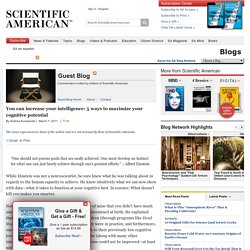
"One should not pursue goals that are easily achieved. Top Geniuses Of All Time - List of 50 Brilliant Minds. Everything I Know. During the last two weeks of January 1975 Buckminster Fuller gave an extraordinary series of lectures concerning his entire life's work.

These thinking out loud lectures span 42 hours and examine in depth all of Fuller's major inventions and discoveries from the 1927 Dymaxion house, car and bathroom, through the Wichita House, geodesic domes, and tensegrity structures, as well as the contents of Synergetics. Autobiographical in parts, Fuller recounts his own personal history in the context of the history of science and industrialization. The stories behind his Dymaxion car, geodesic domes, World Game and integration of science and humanism are lucidly communicated with continuous reference to his synergetic geometry.
Permeating the entire series is his unique comprehensive design approach to solving the problems of the world. This printed work before you is a transcript of those lectures. -- The Buckminster Fuller Institute First Edition. “Nikola Tesla was not in this for the money. He... Intelligent Complex Adaptive Systems. I don’t believe in the existence of a complex systems theory as such and, so far, I’m still referring to complex systems science (CSS) in order to describe my research endeavours.
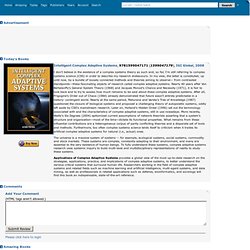
In my view, the latter is constituted, up until now, by a bundle of loosely connected methods and theories aiming to observe— from contrasted standpoints—these fascinating objects of research called complex adaptive systems. Nearly 40 years after Von Bertalanffy’s General System Theory (1968) and Jacques Monod’s Chance and Necessity (1971), it is fair to look back and to try to assess how much remains to be said about these complex adaptive systems. After all, Prigogine’s Order out of Chaos (1984) already demonstrated that future wasn’t entirely predictable in a history- contingent world. HUMAN ECOLOGY: An Interdisciplinary Journal. Human Ecology Review. The Society for Human Ecology. Human Ecology. Copyright Information For Authors Submission of a manuscript implies: that the work described has not been published before (except in form of an abstract or as part of a published lecture, review or thesis); that it is not under consideration for publication elsewhere; that its publication has been approved by all co-authors, if any, as well as – tacitly or explicitly – by the responsible authorities at the institution where the work was carried out.

Author warrants (i) that he/she is the sole owner or has been authorized by any additional copyright owner to assign the right, (ii) that the article does not infringe any third party rights and no license from or payments to a third party is required to publish the article and (iii) that the article has not been previously published or licensed. The author signs for and accepts responsibility for releasing this material on behalf of any and all co-authors. Author is requested to use the appropriate DOI for the article. For Readers. Complexity: It’s Not That Simple. Complexity theory has been around for a generation now, but most people don’t understand it.
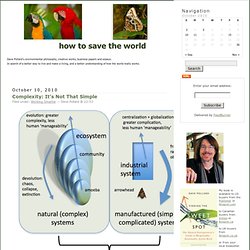
I often read or listen to consultants, ‘experts’ and media people who proffer ludicrously simplistic ‘solutions’ to complex predicaments. Since it seems most people would prefer things to be simple, these ‘experts’ always seem to have an uncritical audience. Why we hate Complexity. Natural and social systems are complex — that is, not entirely knowable, unpredictable, resistant to cause-and-effect analysis, in a word, mysterious.
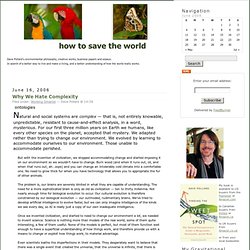
For our first three million years on Earth we humans, like every other species on the planet, accepted that mystery. We adapted rather than trying to change our environment. We evolved by learning to accommodate ourselves to our environment. Those unable to accommodate perished. Complex systems made simple. Albert-László Barabási and Yang-Yu Liu, together with their collaborator Jean-Jacques Slotine at M.I.T., have developed a method for observing large, complex systems.
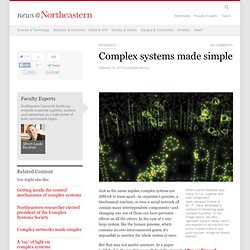
In the image above, red dots represent sensor nodes, which are required to reconstruct the entire internal state of one such system. Image by Mauro Martino. Just as the name implies, complex systems are difficult to tease apart. An organism’s genome, a biochemical reaction, or even a social network all contain many interdependent components—and changing any one of them can have pervasive effects on all the others.
Observability of complex systems. Author Affiliations Edited by Giorgio Parisi, University of Rome, Rome, Italy, and approved December 26, 2012 (received for review September 6, 2012) Abstract A quantitative description of a complex system is inherently limited by our ability to estimate the system’s internal state from experimentally accessible outputs.
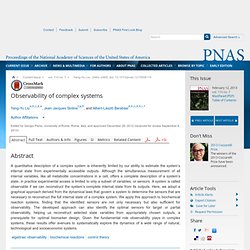
Although the simultaneous measurement of all internal variables, like all metabolite concentrations in a cell, offers a complete description of a system’s state, in practice experimental access is limited to only a subset of variables, or sensors. Chaos & Complexity Pdf Library > GaianXaos. Center for Complex Networks and Systems Research. UPDATE: As of 2015 the GiveAlink project has been archived and the GiveALink.org website is no longer operational.
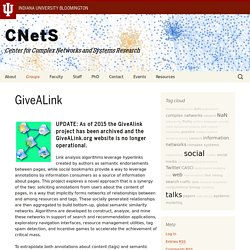
Link analysis algorithms leverage hyperlinks created by authors as semantic endorsements between pages, while social bookmarks provide a way to leverage annotations by information consumers as a source of information about pages. This project explores a novel approach that is a synergy of the two: soliciting annotations from users about the content of pages, in a way that implicitly forms networks of relationships between and among resources and tags. These socially generated relationships are then aggregated to build bottom-up, global semantic similarity networks. Algorithms are developed to construct, analyze, and mine these networks in support of search and recommendation applications, exploratory navigation interfaces, resource management utilities, tag spam detection, and incentive games to accelerate the achievement of critical mass. Project Members. About « Complex Diagrams. The name Complex Diagrams is drawn from my master’s thesis, which is all about how to design effective, qualitative diagrams with non-trivial levels of complexity.
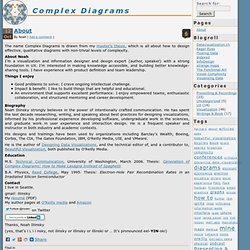
About Noah I’m a visualization and information designer and design expert (author, speaker) with a strong foundation in UX. I’m interested in making knowledge accessible, and building better knowledge-sharing tools. I have experience with product definition and team leadership. Things I enjoy Good problems to solve: I crave ongoing intellectual challenge.Impact & benefit: I like to build things that are helpful and educational.An environment that supports excellent performance: I enjoy empowered teams, enthusiastic collaboration, and structured mentoring and career development. Biography Noah Iliinsky strongly believes in the power of intentionally crafted communication. List of systems sciences organizations. Systems science is the interdisciplinary field of science surrounding systems theory, cybernetics, the science of complex systems.
It aims to develop interdisciplinary foundations, which are applicable in a variety of areas, such as engineering, biology, medicine and social sciences. Systems science and systemics are names for all research related to systems theory. Complexity Digest - Networking the Complexity Community. Complexity map castellani map of complexity science. Social science complexity theory computational methods. How does Social Science benefit from Complexity Theory and Computational Methods? We explore complex systems inhabited by human beings.
These systems are biological, social, cultural, technological and creative. Simplexity. Simplexity is an emerging theory that proposes a possible complementary relationship between complexity and simplicity. The term draws from General Systems Theory, Dialectics (philosophy) and Design. Jeffrey Kluger wrote a book about this phenomenon that describes how house plants can be more complicated than industrial plants, how a truck driver's job can be as difficult as a CEO's and why 90% of the money donated to help cure diseases are given only to the research of 10% of them (and vice versa). The term has been adopted in advertising, marketing and the manufacture of left-handed screwdrivers. Design aspects[edit] Complexity tends to rise as system elements specialize and diversify to solve specific challenges.Simple interfaces tend to improve the usability of complex systems.
History of the term[edit] Ecco.vub.ac.be. BILINGUAL GLOSSARY OF MULTIDIMENSIONAL QUALIFIERS OF INTELLIGENCE. Studies in Complexity. Home. The Five-Step Maturity Model for Building a Collaborative Organization. In my book, The Collaborative Organization, I featured a maturity model that Chess Media Group created based on our client experience and research. Diauxie. Diauxie is a Greek word coined by Jacques Monod to mean two growth phases. The word is used in English in cell biology to describe the growth phases of a microorganism in batch culture as it metabolizes a mixture of two sugars. Curiosity Is as Important as Intelligence - Tomas Chamorro-Premuzic. By Tomas Chamorro-Premuzic | 11:00 AM August 27, 2014. 10 « October « 2010. Descriptive, Creative and Challenging Imagination. An Introduction to Connective Knowledge ~ Stephen's Web ~ b.
You are not logged in. [] [] The Global Brain Institute. PIAAC. The data collection for the Survey of Adult Skills (PIAAC) took place from 1 August 2011 to 31 March 2012 in most participating countries. ENG_Brochure%20Education%20and%20Skills%20Online%20SAS_Oct%2013. Educational semantic web. P2P Foundation. PIAAC. Organisation for Economic Co-operation and Development. _Skills_Outlook_2013.pdf. PIAAC. Data from the Survey of Adult Skills will allow investigation of the links between key information-processing skills and a range of variables, constituting a rich evidence base for policy-relevant analysis.
The Lens I: What it’s all about - Science as Social Enterprise. 12-8-11 Presentation Handouts.docx. Rheology. The Society of Rheology Home Page. The European Society of Rheology. Origin_of_rheology.